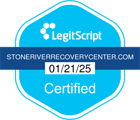It is normal to feel angry from time to time. After all, anger is a common human emotion. Even so, anger can be one of the most challenging emotions to deal with when recovering from an addiction. Unresolved anger, resentments, and grudges can act as dangerous triggers that increase the risk of relapse. Learning how to let go of anger in a healthy way is crucial for maintaining your sobriety and moving forward with a peaceful life in recovery.
There are many potential sources of anger for those in recovery:
- Self-directed anger over past mistakes and the consequences of your addiction
- Anger toward others who you feel were unsupportive or who enabled your addiction
- Frustration with the challenges and life disruptions caused by getting sober
- Resentment over having to give up your addictive behavior and preferred coping mechanism
- General irritability as you get through the emotional roller coaster of early recovery
- Anger at or jealousy of others who can still engage in substance use
No matter the source, it’s crucial to find healthy outlets to process anger before it festers and threatens your sobriety. Unresolved anger often lives at the root of relapse. Anger can also cause serious health problems, such as heart disease and stroke.
How to Release Anger in a Healthy Way
When you feel anger building up inside you, try these techniques to release it without acting on it in unhealthy or destructive ways:
- Exercise: Going for a walk or run, hitting the gym, or playing sports can help redirect angry energy into something more productive. Exercise can also help you release negative emotions and feel more positive.
- Write it out: Keeping a journal or writing letters you never send gets angry feelings out of your mind and puts them on paper. You can also read what you wrote to gain insight into what triggers your anger.
- Use relaxation techniques: Deep breathing, meditation, yoga, or prayer can calm anger and help you relax. Try various holistic techniques to find what works for you.
- Talk it through: Discussing your angry feelings with a counselor or support group gets it off your chest. Having someone listen to your feelings can often make a difference. Don’t hold in the anger and let it get to you. Release it by talking it through.
- Get creative: Artistic outlets like painting, music, and crafting can process the emotion into something creative and positive. Art can be an emotional release and help you discover what is troubling you.
The key is to find anger release techniques that work for you and use them whenever you need to process this powerful emotion. Letting anger fester by bottling it up often leads to an explosive outburst or a return to your addictive patterns.
Moving Forward with Peace and Less Anger
The more you practice healthy anger release, the more it will become a habit to process angry feelings as they arise. You’ll find that you feel at peace more often than consumed with resentment, rage, or bitterness. Making this a consistent practice allows you to get ahead of anger before it intensifies and spirals out of control.
Make a conscious effort to cultivate more positive emotions like gratitude, joy, and compassion. These uplifting mindsets will counteract and eventually displace the angry tendencies. Surround yourself with positive people, thoughts, and activities that add more light to your life. Having a strong support system is vital for your recovery and can encourage you to get through difficult times, even when you may feel angry.
Anger can be tricky, but it’s only one human emotion. Don’t let it derail your recovery journey. Keep using the tools you’ve learned to let go of anger and choose peace and acceptance. If you or a loved one are struggling with substance use or mental health disorders, help is available. At Stone River Recovery Center in San Antonio, Texas, we offer residential treatment and detox services as well as outpatient mental health services and substance use treatment. To learn more about how we can help, please contact us today.








